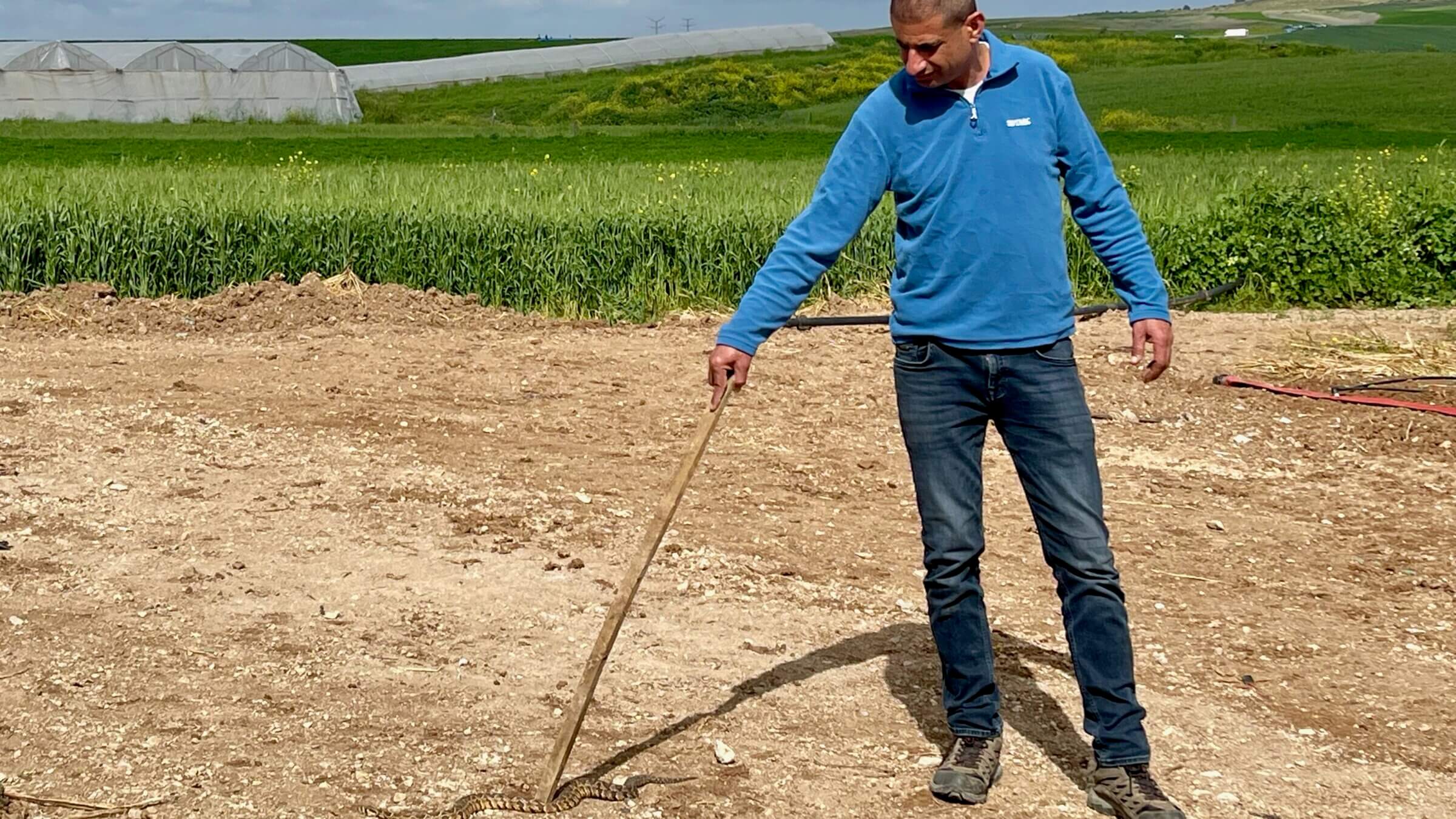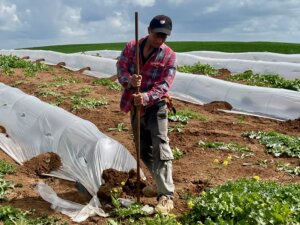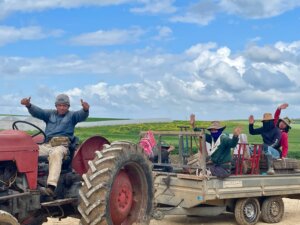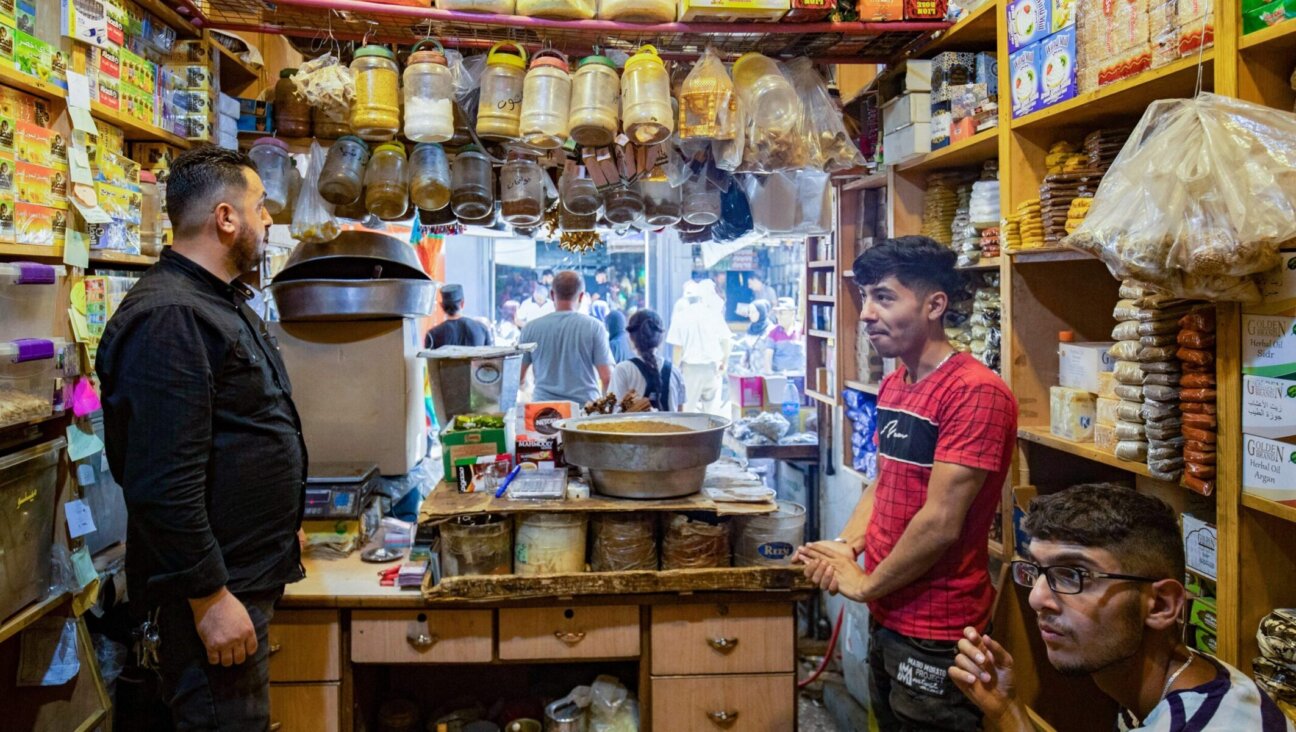A forgotten front in the war: Israel’s farms at risk of failing for lack of low-wage labor
Volunteers poured in after Oct. 7, but they’re no replacement for migrant workers

Third-generation vegetable grower Adi Dafna — and a snake — on the farm that lost most of its paid workers after Oct. 7. Photo by Susan Greene
MOSHAV NAHALA, Israel — For weeks after Oct. 7, busloads of 50 to 100 Israelis pulled up each morning to Adi Dafna’s vegetable farm to help harvest his tomatoes and cucumbers and plant new ones for winter.
In a grieving and divided nation, the outpouring reflected Israelis’ willingness to roll up their sleeves and come together in crisis, with volunteer pickers pitching in to replace Palestinian laborers barred from entering the country and foreign workers who fled because of the Hamas terror attack.
But after five months of war, as winter turns to spring, the buses have stopped coming, low-wage farm labor is still scarce, and Dafna has lost more than half his produce and nearly all his profits. He is worried that he may not be able to stay solvent long enough to pass down to his teenage sons the 99 acres about a half hour’s drive from the Gaza border that his grandfather, an immigrant from Yemen, homesteaded in 1953.
“Farmers need a different kind of support and we need it now,” said Dafna, 43, one of 89% of Israeli growers who have reported damages to their businesses due to the conflict.
“It’s getting hard to stay optimistic.”
The fate of Israel’s fabled farmlands is a forgotten front in the war — one of many ways that Oct. 7 and its aftermath are battering the country. Experts estimate the war against Hamas is costing the Israeli economy as much as $260 million a day. Tourism has flatlined nationwide. Tech companies’ productivity is low because so many employees spent weeks or months on reserve duty. And consumer confidence is down with no end to the war in sight.
Dafna’s grandfather started working this land in the state’s pioneer-socialist period, when collective farms like this community — moshavim in Hebrew — and agricultural communes, kibbutzim, helped Jews from disparate backgrounds connect with each other. Keeping the soil in production became a security priority for Israelis concerned they would lose it to Arab residents if they didn’t use it. Many also idealized farm work as a way to raise young people capable of physically defending the country and ensure Israel would have an independent food supply and not have to rely on trading with hostile neighbors.
But as Jews gravitated to higher-paying jobs in cities, starting as early as the 1960s and ’70s, these farmers came to rely on Palestinian day workers to make their desert bloom. That arrangement, always strained because of the larger conflict around land, was upended by strikes and terror attacks during the first Palestinian intifada, or uprising, starting in 1987. The government restricted Palestinians’ ability to enter Israel for work and started recruiting abroad.
Thailand was a natural choice because so many of its people live in poverty and because Israel had in the 1970s and ’80s trained about 300 Thais on agricultural techniques, according to a soon-to-be published study by scholars Yahel Kurlander, Shahar Shoham and Matan Kaminer. The trio describes taylandim — Hebrew slang for Thai workers — as “obedient” and “docile,” willing to work for far less than Israeli Jews, and free of the security threats farmers worried about with Palestinians.
Their study details ways the taylandim, who soon became the largest group of foreign nationals in Israel, were exploited, along with recent reforms put in place to protect them. Before Oct. 7, there were about 30,000 Thai farm workers here, making up about 85% of the nation’s agricultural workforce; 97% of them were men, earning eight to 10 times the wages they could in Thailand, and sending most of the money home to support their families.

Dafna’s father started hiring Thai workers from the Udon region, near Laos, in 1994. Dafna now has permits for 12 of them, plus an agreement with another farm to hire 13 it doesn’t need. He said he pays them $2,217 to $2,771 a month, significantly more than Israel’s minimum wage of $1,544 monthly.
Of the 25 Thai workers on his farm before the Hamas terror attack, 19 were among the estimated 10,000 who quickly fled on flights provided by their government. Dafna said that some were so scared on Oct. 7 they refused to go outside for days afterward for fear that terrorists might still be hiding in the fields.
Dafna also used to employ about 10 Palestinians from Gaza or the occupied West Bank, but they are now banned. Which is fine with Dafna, who rushed to the site of the Nova music festival on Oct.7 and is still haunted by the evidence of atrocities he saw there.
“Never again,” he said about working with Palestinians.
So the farmwork is left to the six Thai workers who stayed and another three who came after the war began, figuring that their earnings outweigh the security risks. They live together in a house on Dafna’s land, and work eight to 10 hours a day, six days a week. He said he buys them Thai rice and other ingredients from their home country.
When I visited the farm last week, the workers were covered head to foot to protect themselves from sun, bugs and thorns. Some hacked at milk-thistle weeds while others hunched over, picking eggplant and zucchinis.
They communicate with Dafna through their manager, Pon Sak, who is 40, has worked on the farm for 13 years, and speaks limited Hebrew. My questions about their work, lives and experiences in the war went mostly unanswered.
Dafna acknowledged that the workers are physically and socially isolated. It took a few days after the Oct. 7 attack for them to learn that 39 of their countrymen had been killed and 26 abducted. And they heard it from their families and social media networks, not through any official channels.
Dafna said he was moved by the outpouring of support from Israeli volunteers in the first weeks of the war. They put their hearts into his farm, he said, and that heart is what he loves about his country.
But by late November and early December, as offices and schools reopened, fewer and fewer showed up. Voluntourists from the U.S. and France rushed in — one nonprofit, HaShomer HaChadash, says it has placed 260,000 volunteers on farms since October — but Dafna said this is not a sustainable solution.
It’s unpredictable when volunteers will show up, he explained, and even the most well-meaning city folk have trouble discerning weeds from crops or remembering to walk between rows, not over them. Besides, many wince at the smell of fertilizer and, as I observed, freak at the sight of a snake.
Dafna and other farmers told me they need a steady stream of low-wage workers willing to get down in the dirt, day after day, despite the callouses and backaches. Without reliable replacements for the Thai and Palestinian workers they lost in October, they say, they will not be able to make a living from the land.
“It really is the biggest agricultural crisis the state of Israel has ever seen,” said Maya Arfi, a spokesperson for HaShomer HaChadash.
In January, Israel’s cabinet increased the number of foreign agricultural workers allowed into the country by 10,000. Most new work permits haven’t been processed yet and, even when they are, experts say it would still leave growers about 30,000 short of the total they need. Aside from Thailand, Israel has been looking into recruiting workers from Sri Lanka, India, Moldova, Malawi and Kenya.

But, given Israel’s historical strictness regarding foreign nationals living in the country, no one I interviewed expects enough of those workers to arrive soon enough. Farmers, two scholars and a labor leader I spoke with said the farmhand shortage was building up long before the war, and have little faith in the government making agriculture a priority now.
Even if the government did loosen restrictions, it’s unclear how many migrant workers would want to come. It doesn’t help that most farms are in the two areas of Israel regularly pounded by missiles from Gaza and Lebanon. A farm worker from southern India was killed and two others seriously injured last week while working near Israel’s northern border. India’s government has since advised its workers to move to safer parts of Israel.
Thailand’s embassy didn’t return phone calls about whether workers who evacuated after Oct. 7 — or new ones — are applying to return to Israel, as Dafna and many farmers hope.
Aside from busing in volunteers, HaShomer HaChadash has been helping farmers cut through red tape in seeking government grants and trying to arrange emergency farm loans through private investors. It’s a tough sell, given that experts expect the economy here to continue nosediving beyond its nearly 20% slump last quarter.
Moody’s downgraded the country’s credit rating for the first time ever last month, from A1 to A2, and said the outlook for its economy was “negative.”
In the meantime, Dafna and his small crew of Thai workers are busy picking the last of their winter harvest. They’ll move on soon to plant for spring because, as Dafna tells it, you can’t be a farmer or an Israeli without hope.
Three volunteers from Rohovot drove in last week to help weed some of his fields, as they have every week since October. One, a sports trainer named Irit Sharir, said she knows her few hours of free labor won’t solve Dafna’s worker shortage, but said it is her small way of supporting her now-favorite farmer.
Besides, she added, it makes her “feel better.”
A message from our Publisher & CEO Rachel Fishman Feddersen

I hope you appreciated this article. Before you go, I’d like to ask you to please support the Forward’s award-winning, nonprofit journalism during this critical time.
We’ve set a goal to raise $260,000 by December 31. That’s an ambitious goal, but one that will give us the resources we need to invest in the high quality news, opinion, analysis and cultural coverage that isn’t available anywhere else.
If you feel inspired to make an impact, now is the time to give something back. Join us as a member at your most generous level.
— Rachel Fishman Feddersen, Publisher and CEO






















